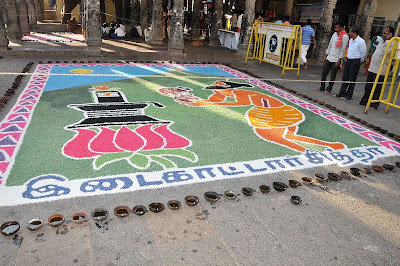Right Click on all photographs to view enlarged version:
All the below photographs were taken at Arunachaleswarar Temple during this year's Mahashivaratri Festival celebrated March 2nd-3rd. Kolams were created in the morning of March 2nd, on the floors throughout the Temple Compound.
The first photograph is of the 12 Jyotirlingams.
All the below photographs were taken at Arunachaleswarar Temple during this year's Mahashivaratri Festival celebrated March 2nd-3rd. Kolams were created in the morning of March 2nd, on the floors throughout the Temple Compound.
The first photograph is of the 12 Jyotirlingams.
The next kolam is of Kannappa, the great devotee of Lord Shiva. To read an earlier posting on this Shiva devotee check out this link here.
The next kolam is of the Tamil Siddhar, Idai Kadar, a saint who was believed to have lived in the third or second Century B.C. in the place that is now known as Tiruvannamalai. There are 18 Siddhars, who are mostly Saivaite saints from Tamil Nadu, who practised an unorthodox type of Sadhana (spiritual practices) and attained siddhic powers.
Idai Kadar’s story goes that once whilst grazing his goats he met and was blessed by a Siddhar of immense divine powers.
Foreseeing difficult times of drought in the world, it is said that Idai Kadar built a house with walls of grain and fed his goats plants that survived without water. To discover the secret of his survival during the drought, the Navagrahas (9 planets) visited Idai Kadar. After eating grain and goat’s milk, the Navagrahas fell asleep. As soon as the planets were sleeping, Idai Kadar arranged the planets in such an order that the world would benefit. Immediately after the planets were repositioned, rain started to fall upon the world.
One of the biggest contributions of Idai Kadar is the invention of the Kayakalpa techniques (i.e. the system of total body rejuvenation).
Idai Kadar attained mahanirvana at Tiruvannamalai and it is believed that his Jiva Samadhi is behind the Siva Sannidhi at Arunachaleswarar Temple.
“Om namah shivaya! Oh, my children! Don’t praise me for anything small I did. Don’t praise petty humans. It’s all because of the power of Lord Shiva and Krishna. So, praising them would make you all flawless souls. Wherever festivals are conducted for them, there will be endless joy and happiness. Worshipping them will liberate you all from your burdens and sorrows. Whenever you have difficult times, believe in God, devote your whole heart and mind to the problem you are facing and the solution for it, don’t worry about the outcome, do your best. You will win the battle for sure. Om namah shivaya!”
In an earlier posting I listed the sequence of the major pujas that were performed at Arunachaleswarar Temple during the night and early morning of March 2nd and 3rd, 2011.
As is customary on the night of Mahashivaratri, Arunachaleswarar Temple stayed open throughout the night. The Temple tanks were illuminated with ghee lamps, and crowds milled throughout the Temple's grounds.


In the Temple Auditorium the Festival was celebrated by musical programmes, dramas and classical dance
Below are photographs of the Lingodbhava puja (at the back of the Shiva Sannidhi) which was performed on the night of Mahashivaratri.


Mahashivaratri is the only night of the year that the Ketaki Flower (screwpine) is used in the worship of Lord Shiva -- to read the story of how the Flower supported Brahma's lie to Shiva and the consequences of the lie, check out this link here.






